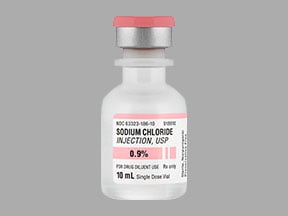
Sodium Chloride (pf) Coupons & Savings Card – Discount Prices from $3.30
Sodium chloride, commonly known as salt, is an essential mineral composed of sodium and chloride ions. It plays a vital role in maintaining the body's fluid balance, nerve function, and muscle contractions. In medical settings, sodium chloride solutions are widely used for various purposes. For instance, a 0.9% isotonic sodium chloride solution, often referred to as normal saline, is utilized for intravenous fluid replacement to treat dehydration and electrolyte imbalances. Additionally, higher concentration solutions, such as a 3% hypertonic sodium chloride solution, are employed in specific clinical situations requiring rapid sodium replenishment. These sterile solutions are typically packaged in glass bottles of varying volumes, including 500 ml and 1000 ml, to accommodate different medical needs.
Our coupons are free to use. Before paying, show the pharmacist your Sodium Chloride (pf) savings card to get your free discount. Use our filters below to edit the prescription box to match your needs. The Sodium Chloride (pf) prices will update based on your prescription needs. Above our Sodium Chloride (pf) coupons, you can change your location to see pharmacy prices and costs in other areas. We're here to help you buy Sodium Chloride (pf) at the lowest price with our prescription discount card.
My prescription
Edit
60 solutions 10ML of 0.9%, Sodium Chloride (pf) (1 Syringe)
Select pharmacy

CVS
$19.69
COUPON PRICE
Walmart
$3.30
COUPON PRICE
Walgreens
$4.29
COUPON PRICE
Albertsons
$4.46
COUPON PRICESodium Chloride (pf) savings card
Show this card to your pharmacist
Walmart
$3.30
BIN
ID
PCN
GRP
019876
LH2ED90CB7
CHIPPO
LHX
Powered by
Sodium chloride, commonly known as salt, is an essential mineral composed of sodium and chloride ions. It plays a vital role in maintaining the body's fluid balance, nerve function, and muscle contractions. In medical settings, sodium chloride solutions are widely used for various purposes. For instance, a 0.9% isotonic sodium chloride solution, often referred to as normal saline, is utilized for intravenous fluid replacement to treat dehydration and electrolyte imbalances. Additionally, higher concentration solutions, such as a 3% hypertonic sodium chloride solution, are employed in specific clinical situations requiring rapid sodium replenishment. These sterile solutions are typically packaged in glass bottles of varying volumes, including 500 ml and 1000 ml, to accommodate different medical needs.
Our coupons are free to use. Before paying, show the pharmacist your Sodium Chloride (pf) savings card to get your free discount. Use our filters below to edit the prescription box to match your needs. The Sodium Chloride (pf) prices will update based on your prescription needs. Above our Sodium Chloride (pf) coupons, you can change your location to see pharmacy prices and costs in other areas. We're here to help you buy Sodium Chloride (pf) at the lowest price with our prescription discount card.
Sodium Chloride (pf) dosage forms
Use our Sodium Chloride (pf) 10ML of 0.9% coupon with prices from $3.30 for 1 Vial. You can also use our Sodium Chloride (pf) 10ML of 0.9% coupon with prices from $4.10 for 2 Vials. We have a Sodium Chloride (pf) 10ML of 0.9% coupon with prices from $4.90 for 3 Vials.
Dosage Quantity Price from Per unit 10ML of 0.9% 1 Vial $3.30 $3.30 10ML of 0.9% 2 Vials $4.10 $2.05 10ML of 0.9% 3 Vials $4.90 $1.63
| Dosage | Quantity | Price from | Per unit |
|---|---|---|---|
| 10ML of 0.9% | 1 Vial | $3.30 | $3.30 |
| 10ML of 0.9% | 2 Vials | $4.10 | $2.05 |
| 10ML of 0.9% | 3 Vials | $4.90 | $1.63 |
